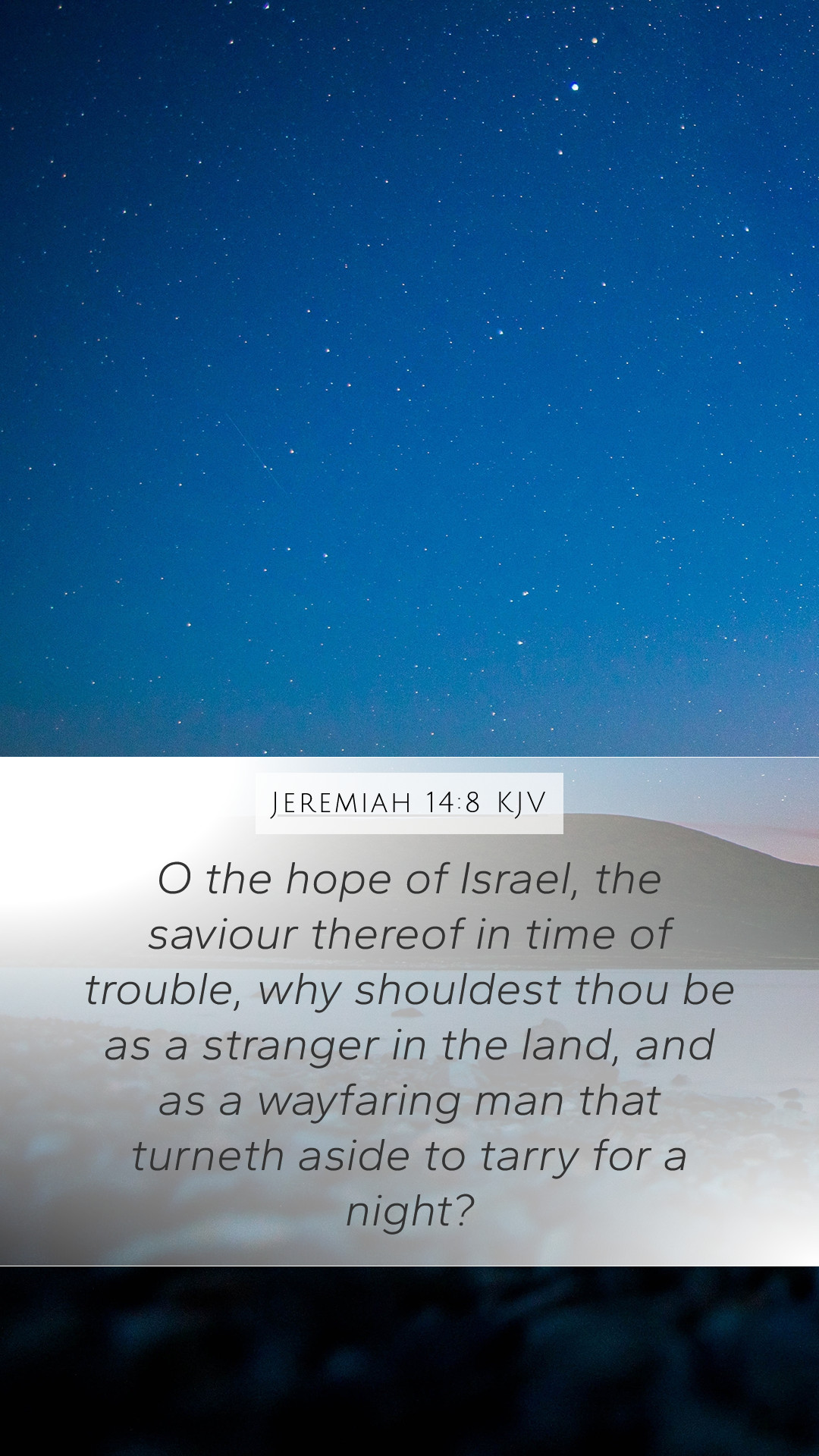Understanding Jeremiah 14:8: A Comprehensive Bible Verse Commentary
Verse: Jeremiah 14:8 states, "O thou hope of Israel, the savior thereof in time of trouble, why shouldest thou be as a stranger in the land, and as a wayfaring man that turneth aside to tarry for a night?"
Introduction to the Biblical Context
This verse is embedded within the broader narrative of the Book of Jeremiah, which deals with prophetic messages concerning the impending judgment on Judah due to their unfaithfulness. Jeremiah, often referred to as the weeping prophet, offers a profound insight into the nature of God as the hope and savior of Israel amidst their dire situations.
Interpretation and Explanation
The verse communicates a deep yearning for God's presence and intervention. Through the lens of Bible verse interpretations, we see multiple layers of significance that can be derived from the text.
-
God as the Hope of Israel:
Jeremiah recognizes God as the unchanging source of hope for His people. This hope is not just a fleeting sentiment but is tied directly to God's saving actions during times of distress.
-
The Nature of Human Distress:
The verse implies a stark acknowledgment of human vulnerability. The imagery of God as a 'stranger' shows a deep emotional plea—why, in times of trouble, does it seem like God is distant?
-
Symbolism of the Wayfaring Man:
The reference to a 'wayfaring man' suggests transience and temporary presence. Here, Jeremiah expresses concern over perceived abandonment by God, questioning why He seems to neglect His covenant people during hardship.
Biblical Exegesis: Insights from Commentaries
Matthew Henry's Commentary: Henry emphasizes the hopelessness felt by God's people in exile, reminding readers of the importance of unwavering faith in God's promises. He underscores the urgency of returning to God's ways to experience His saving grace.
Albert Barnes's Notes: Barnes presents further analysis by interpreting the 'hope of Israel' as both a reference to past deliverance and future redemption. He also eloquently describes God’s desire to save, yet laments the people's lack of repentance.
Adam Clarke's Commentary: Clarke elaborates on the nuances of the verse, pointing out that Israel's distress was self-inflicted through disobedience. His focus remains on the necessity of seeking God sincerely, as this opens pathways for divine intervention.
Practical Applications
In applying the meaning of Jeremiah 14:8 to daily life, one might consider the following:
- Reflecting on one's relationship with God during difficult times and recognizing that feelings of abandonment can be a natural part of spiritual growth.
- Engaging in Bible study groups or online Bible study to facilitate discussions on understanding Scripture effectively.
- Utilizing Bible study tools and resources to deepen one’s comprehension of prophetic literature and its relevance today.
Related Biblical Cross References
- Psalm 42:5 - "Why art thou cast down, O my soul? and why art thou disquieted within me?"
- Isaiah 48:17 - "Thus saith the LORD, thy Redeemer, the Holy One of Israel; I am the LORD thy God which teacheth thee to profit..."
- Hosea 14:3 - "For in thee the fatherless find mercy."
Conclusion
Jeremiah 14:8 serves as a poignant reminder of the longing for God's comfort and assurance in troubling times. By exploring the Bible verse meanings through historical context and personal reflection, individuals can enrich their spiritual lives. Understanding Scripture is essential, and this verse invites readers to delve deeper into God's fidelity and our need for His saving grace.


